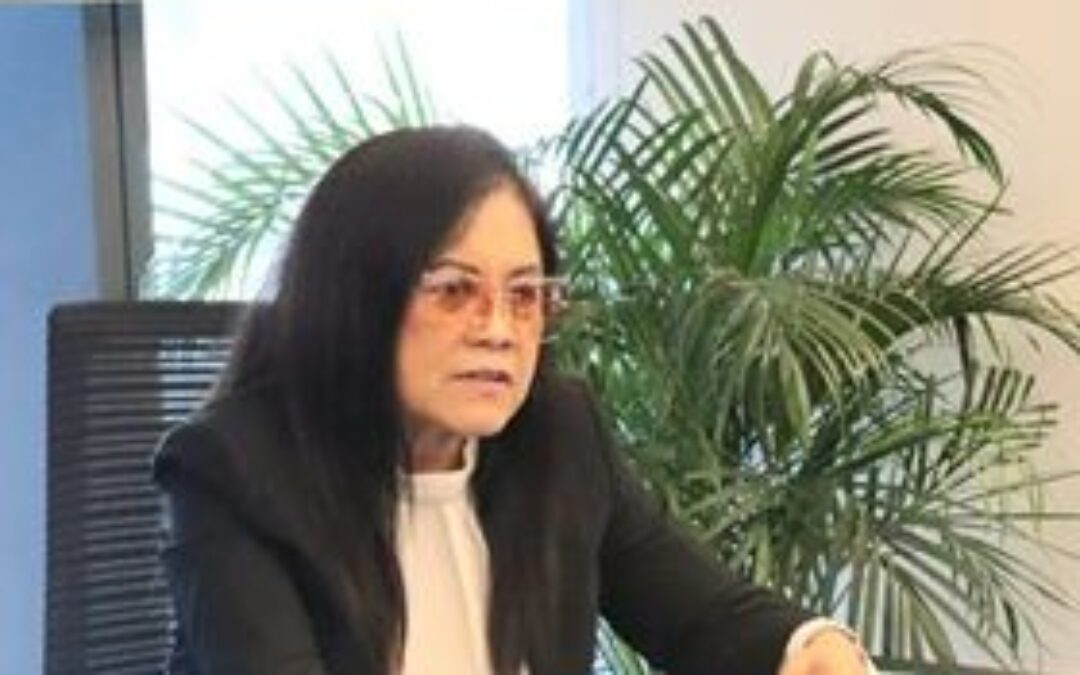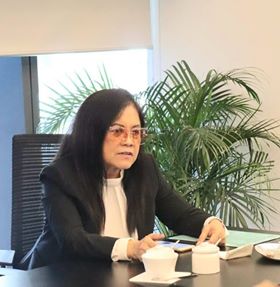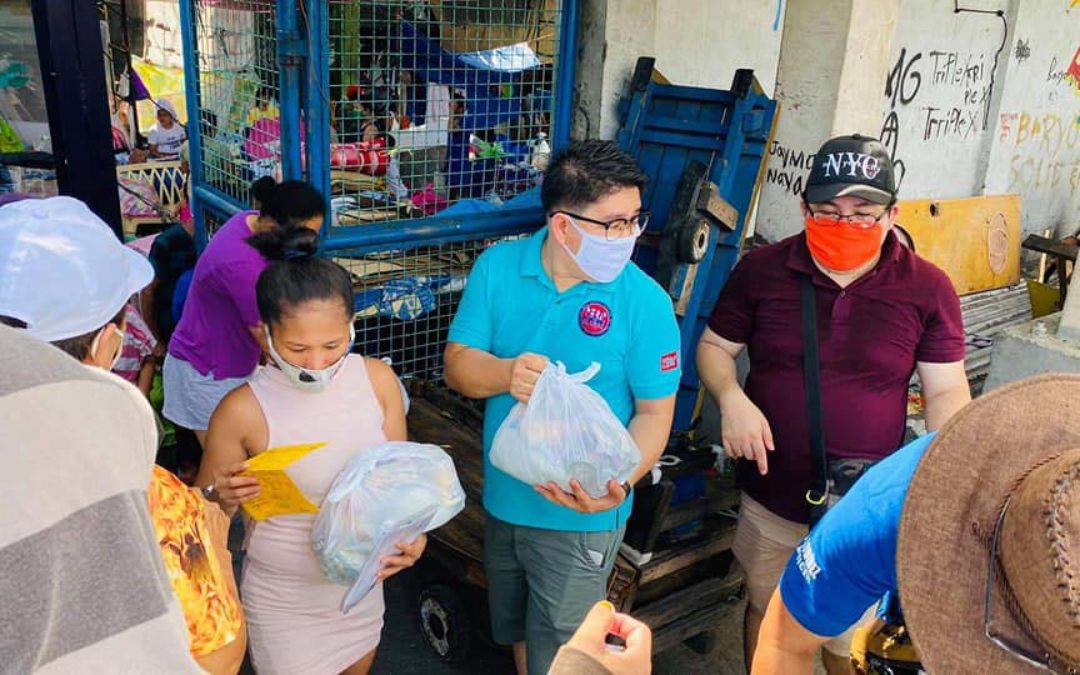
by Myk | Aug 16, 2020

A LOOMING PARADIGM SHIFT
By: CRB Norie G. Datar
The unprecedented magnitude of the tragic brought by the global outbreak of COVID-19 and as the world continues to battle the war against this virus, by force of nature slowly changed the way people live and think, driving us to adapt a new life model, attuned to the changing environment. People are learning to adapt a “flux mindset”, exuding the power of resilience, moving into a new direction, a new roadmap to bridge the situation now and then.
How do we moved-on with the changing times? As we navigate the world of real estate and recognizing the industry as one of the major economic drivers in the Philippine economy and the real estate service practitioners’ key role, it is of paramount importance to look at the aspects in the practice that have directly impacted by the pandemic that leaves us no better option but to stay relevant to the new environment.
With all rationality, I am looking at the Continuing Professional Development (CPD) program, as one aspect. It is crucial at this point in time that we maintain a strong working knowledge with reasonable proficiency. It is now time to re-evaluate the kind of knowledge and the kind of learning materials we need to possess. We need to provide fresh knowledge, most relevant at this time and shelved those recycled lecture materials. We need to re-establish an acceptable and doable standards of learning to further strengthen the future of our profession. We need to shift trajectory and infuse subjects that are apt with the changing times.
Another aspect that we should be looking at, is the proliferation of unlicensed practitioners. We have aired so much of our sentiments at the various social media platforms, now it is time to zero-in and act constructively on how we should be dealing the issue, not discounting human consideration, as we all need to survive. While waiting for the rebirth of AIPO, we can do our part to address this most defining issue of our time. Let us create a venue to collaborate and deliberate professionally, in order to come-up with an effective ways to institutionalize our practice.
As people look at the future of the industry as bleak, clouded by fear and uncertainty, it is therefore, high-time to recalculate, find new territories, and break new grounds, to see lights and brightness.
Should we be ruled by fear and uncertainty?
Just my two cents.
CRB NORIE DATAR
REBAP Global City
About the author
CRB Norie G. Datar, MPA, DTM, REA, REB, EnP., is one of the 2020 REBAP Global City Chapter Advisers. She was 2015 and 2016 REBAP Chapter President for Global City, 2018 REBAP National Board of Trustees and 2019 REBAP National Secretary General.

by Doah Sto. Tomas | Jul 13, 2020

You’re determined to break into the real estate industry. Good for you! But as you learn more about the industry, you hear terms like Project Selling and General Brokerage and wonder if there’s really a difference. We’ve created a simple table below to help you decide where you really think you are better suited. Here’s a breakdown of the difference between the two:
In this table, we focus first on the differences from the perspective of an agent:
| Salesperson – Project Selling |
Salesperson – General Brokerage |
| If working for a developer, they are usually referred to as “in-house agents” |
Normally referred to as “property specialists” or “real estate salespersons” (if PRC-licensed) |
| Generally given an allowance |
Generally, earns on commission basis only |
| Usually assigned a sales quota |
Normally does not have a sales quota |
| Works in an office with regular working hours |
Flexible working hours. Can work in an office or from home (depending on the arrangement with the broker or realty corporation) |
| Can either be regular or contractual employees |
Generally, no employee-employer relationship exists between the agent and the broker |
| Work is normally limited to selling. Documentation and transfer of titles is done by the developer |
Generally more experienced than in-house agents as they know how to take care of the documentation and registration for the buyer and seller. |
|
If assigned to a broker working for a specific developer (i.e. an in-house broker), agent is usually limited to selling property of the developer only.
If assigned to a broker that works for (or owns) a realty corporation that is accredited with multiple developers, agent can sell properties of developers the broker is accredited with (i.e. “sell-all”)
|
|
Entitled to commissions
|
| If under an in-house broker, commission rate is dictated by the developer.
If under a “sell-all” broker, commission rate will vary per developer |
Rate is dependent on agreed arrangement with broker (rates are usually higher) |
| Must obtain DHSUD ( formerly known as HLURB) accreditation, regardless if agent is doing project selling or “sell-all”. |
Not required to obtain DHSUD ( formerly known as HLURB) accreditation as long as properties being handled are FSBO (For Sale By Owner). Otherwise, both broker and agent must secure accreditation in order to do project selling. |
| Must be assigned to a licensed broker in order to be able to sell properties |
| Under RESA law (RA 9646), a person can only be called a “real estate salesperson”, if they obtain a PRC (Professional Regulation Commission) license and is assigned to a licensed broker |
Next, let’s look at project selling and general brokerage from a broker’s point of view:
| Broker – Project Selling |
Broker – General Brokerage |
| Must pass the broker’s licensure exam in order to be PRC-licensed. Once the license has been issued by the PRC, the broker will be able to operate and manage a real-estate business, aside from selling and/or leasing properties. |
| Must undergo continuing professional education (CPD) courses |
| Answerable to the Real Estate Code of Ethics as required by the PRC |
| Must obtain DHSUD ( formerly known as HLURB) accreditation, regardless if broker is doing project selling or “sell-all”. |
Not required to obtain DHSUD ( formerly known as HLURB) accreditation as long as properties being handled are FSBO (For Sale By Owner). |
| If working for a developer, can only sell property of the developer.
If working for a realty corporation accredited with multiple developers, can sell all properties the realty corporation is accredited with. |
Can sell / lease all types of properties.
In the case of project-selling, the broker (or realty corporation) should be accredited by the developer(s).
|
| Usually assigned a sales quota |
Normally does not have a sales quota |
| Works in an office with regular working hours |
More flexible, can work from home. May optionally maintain an office if the broker owns the realty corporation.
|
| Brokers have more freedom with their work arrangement with the developer or realty corporation.
Does not have any employer-employee relationship with in-house agents. |
Generally, no employee-employer relationship exists between the broker and the agents |
| Work is normally limited to selling. Documentation and transfer of titles is done by the developer. |
More experienced than in-house agents/brokers in terms of general knowledge in real estate, as they know the required documentation and registration procedures for both the buyer and seller. They are more exposed to dealing with the BIR, the Assessor’s office, and the Registry of Deeds.
|
| Entitled to commissions. Cannot share commissions with unlicensed real estate practitioners but can only give a “referral fee” instead. |
| If an in-house broker, commission rate is dictated by the developer.
If a “sell-all” broker, commission rate will vary per developer |
Commission rates are typically anywhere from 3% to 5%. |
| Cannot use the salesperson of another broker without prior consent of the broker the agent is currently accredited with. |
Hopefully, this will give you a better idea where you would like to focus on. Some people like to have a narrow focus in what work they do. If you fall under this category, maybe project selling is better for you as a start, or if you simply want to get your feet wet in the real estate industry. But if you like to have variety in what you work with, and like taking on challenges, then general brokerage may just be up your alley.

by Doah Sto. Tomas | Jul 3, 2020

“The ultimate measure of a man is not where he stands in moments of comfort and convenience but where he stands in times of challenge and controversy.” – Martin Luther King Jr.
The POGO Exodus
COVID-19 has been dubbed “the great equalizer”. It doesn’t distinguish between rich or poor, good or evil, young or old, the powerful and the weak, nor does it care about national borders or governments. It is simply a virulent, invisible force of nature that has spread to nearly every corner of the modern world as we know it. Unceremoniously shutting down big and small businesses and companies alike. The pandemic has impacted nearly all industries where human contact and interaction is an essential part of daily operations. And the gaming and amusement industry is no exception to this.
You may ask, what does this have to do with the real-estate industry? It has been no secret that the Philippines, through the PAGCOR (Philippine Amusement and Gaming Corporation) has welcomed POGOs (Philippine Offshore Gaming Operators) with open arms despite being a controversial or touchy subject matter for a lot of Filipinos. The government has touted the country as an ideal destination for online casinos due to. According to PAGCOR, there are 56 PAGCOR-licensed POGOs as of June 2019. And it has been estimated that at least 30 POGO firms are operating illegally in the Philippines. In fact, 265 Chinese nationals were arrested as the result of a raid of an illegal gambling operation in Las Pinas City on May 15, 2020. The illegal POGO was operating out of a rented hotel, even despite the pandemic and quarantine lock-down.
POGOs have come to the Philippines in droves bringing with them thousands of Chinese nationals that operate the lucrative offshore gambling businesses. This huge influx of Chinese nationals of course needed somewhere to stay, and the real estate industry was suddenly rife with opportunity as POGOs started snatching up properties in close proximity to their operations so they could quickly ferry their employees to work. Not only that, a study by KMC Savills Inc. has revealed that POGOs have utilized an estimated 800,000 square meters (or 8,600,000 square feet) of office space to house their operations.
This proved to be a big opportunity for those in the real estate industry. Chinese POGOs were willing to pay higher than the normal rate to lease property in locations near their operations. Property owners were now more than happy to lease out their property with preference for Chinese nationals working at POGOs. However, the downsides would soon rear its ugly head.
Those living in exclusive subdivisions now suddenly had a growing community of noisy Chinese nationals as their neighbors. Complaints and horror stories of property damage began to increase as a significant number of the Chinese nationals apparently had little respect for the property they were living in, as well as a general lack of household cleanliness and regard for property upkeep. Another sad by-product of the POGO real estate gold rush was the artificial shortage of property for Filipino families looking for fairly priced property. Rumors about local tenants being evicted or their lease not being renewed in order to give way to Chinese nationals started to spread as well.
Fast forward to March 21, 2020. In a bid to combat the Covid-19 outbreak, the PAGCOR orders all gambling operations to cease operations until further notice. Needless to say, POGO operations suddenly ground to a screeching halt. Except for those operating illegally, all legitimate POGOs found themselves in a bad financial situation. Gambling operations typically run 24×7 and thereby employs a large number of employees. Now these employees are unable to go to work due to the government-imposed quarantine measures. Surprisingly, PAGCOR even went so far to suspend work-at-home setups for those under their jurisdiction to ensure compliance. POGO licenses and services providers found to be non-compliant now faced possible cancellation of their license and accreditation, and will be reported to the authorities. On top of this, POGOs are currently under scrutiny for unpaid taxes with the BIR (Bureau of Internal Revenue), as well as controversies surrounding a growing number of “sex-dens” servicing foreign workers.
The pandemic in the Philippines still appears to be nowhere near “flattening the curve” as experts put it. To date, at least two POGOs have already left the country and more are now poised to leave the Philippines according to PAGCOR Chairperson and CEO Andrea Domingo. An unspecified number of POGOs have also filed for the cancellation of their licenses, while others have yet to file their official exit. PAGCOR claims that the primary reason for this is not just the impact of the pandemic, but due to “more appealing tax rates” and “friendlier environments” as decision-makers behind the POGOs re-evaluate their options.
With all of this in mind, the most likely scenario is that POGOs are on their way out. And with them goes the potential for cashing in on significantly higher lease rates. Just barely a year ago, POGOs overtook BPOs (Business Process Outsourcing) in real estate utilization and contributed over 6.4 Billion Pesos in taxes. Now, it is only a matter of time before the POGO real estate deep well dries out.

by Doah Sto. Tomas | May 2, 2020
.
May 2, 2020 Saturday, REBAP GLOBAL CITY conducted another Corporate Social Responsibility (CSR) – Bayanihan Disaster Relief Operation and this time the organization has chosen only the 152 families out of 1,055 total affected families of Brgy. 105, Zone 8, District 1, Road 10, particularly GK Compound, Happy Land, Tondo Manila. Portion of this area was hit by fire last April 18, 2020 around 7 o’clock in the morning. Amidst the on- going COVID 19, the residents are facing another tragedy. Responding to their call, REBAP Global City immediately initiated this activity for the purpose duly called for through its Board/ Officers considering that for the month of May 2020, no officers or monthly general membership meeting will be conducted. Thus to make this month active knowing that Enhanced Community Quarantine in NCR is still enforced , the organization decided to shift the regular conduct of monthly meeting into a meaningful, timely and relevant cause – the corporate social responsibility aspect of the organization to do philanthropic mission in times of crisis.
The group of REBAP Global City Officer headed by Its Chapter President CRB Isidro R. Montalban, Jr and members CRB Atty. Jay M. Rallang and CRB Rod Magat proceeded to Brgy. Happy Land to physically distribute the relief goods to each affected family with the help of the local volunteers. The organization is wishing that all affected families be accommodated as much as possible. It was indeed a great shared experience for us to do front lining activity, such as this.
This CSR will not be made possible without the participation and goodwill coming from the following donors and volunteers:
REBAP Global City Officers and CRB Family
Chapter President CRB ISIDRO MONTALBAN JR
Chapter Adviser CRB Norie Datar
VP-Internal CRB Doah Sto Tomas
CRB Emm Garingalao
CRB Atty. Jay Rallang
CRB Rod Magat
Ms. Irin Rebollo
Brgy. 176 Kagawad Pia Estayo
Ms. Emmalyn A. Sacdalan
MRV Prime Appraisal and Property Management Corporation
PHILREP Realty Corporation
Magdalo Volunter President of the Deepest Area – Manila Chapter – Mr. Alan Godinez
Magdalo Manila Chapter Secretary – Ms. Helen Bermejo
Chairwoman Elenita G. Reyes, the Brgy. Treasurer and volunteers.
Residents of Happy Land Brgy 105 Tondo
REBAP Global City is thanking everyone. And to all the affected residents, just stay safe, stay strong, and stay healthy all the time. Keep the faith and spirit alive!







